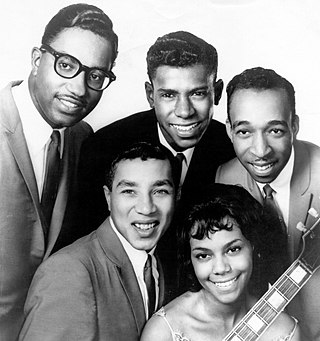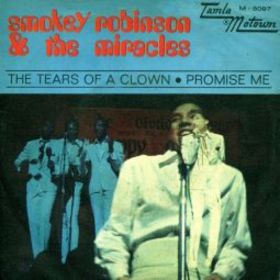Related Research Articles

Mary Esther Wells was an American singer, who helped to define the emerging sound of Motown in the early 1960s.

The Miracles were an American vocal group that was the first successful recording act for Berry Gordy's Motown Records, and one of the most important and most influential groups in the history of pop, soul, R&B and rock and roll music. The group's international fame in the 1960s, alongside other Motown acts, led to a greater acceptance of Rhythm & Blues and pop music in the U.S., with the group being considered influential and important in the development of modern popular music.

"Someday We'll Be Together" is a song written by Johnny Bristol, Jackey Beavers, and Harvey Fuqua. It was the last of twelve American number-one pop singles for Diana Ross & the Supremes on the Motown label. Although it was released as the final Supremes song featuring Diana Ross, who left the group for a solo career in January 1970, it was recorded as Ross' first solo single and Supremes members Mary Wilson and Cindy Birdsong do not sing on the recording. Both appear on the B-side, "He's My Sunny Boy".

"Stop! In the Name of Love" is a 1965 song recorded by the Supremes for the Motown label.

"Baby Love" is a song by American music group the Supremes from their second studio album, Where Did Our Love Go. It was written and produced by Motown's main production team Holland–Dozier–Holland and was released on September 17, 1964.

"Love Child" is a 1968 song released by the Motown label for Diana Ross & the Supremes. The second single and title track from their album Love Child, it became the Supremes' 11th number-one single in the United States, where it sold 500,000 copies in its first week and 2 million copies by year's end.

"My Girl" is a soul music song recorded by the Temptations for the Gordy (Motown) record label. Written and produced by the Miracles members Smokey Robinson and Ronald White, it became the Temptations' first U.S. number 1 single, and is currently their signature song. Robinson's inspiration for writing "My Girl" was his wife, Miracles member Claudette Rogers Robinson. The song was included on the Temptations 1965 album The Temptations Sing Smokey. In 2017, the song was selected for preservation in the National Recording Registry by the Library of Congress as being "culturally, historically, or artistically significant".

"Get Ready" is a Motown song written by Smokey Robinson, which resulted in two hit records for the label: a U.S. No. 29 version by The Temptations in 1966, and a U.S. No. 4 version by Rare Earth in 1970. It is significant for being the last song Robinson wrote and produced for the Temptations, due to a deal Berry Gordy made with Norman Whitfield, that if "Get Ready" did not meet with the expected degree of success, then Whitfield's song, "Ain't Too Proud to Beg", would get the next release, which resulted in Whitfield more or less replacing Robinson as the group's producer.

"The Tears of a Clown" is a song written by Hank Cosby, Smokey Robinson, and Stevie Wonder and originally recorded by Smokey Robinson & the Miracles for the Tamla Records label subsidiary of Motown, first appearing on the 1967 album Make It Happen. The track was re-released in the United Kingdom as a single in July 1970, and it became a number-one hit on the UK Singles Chart for the week ending September 12, 1970. Subsequently, Motown released a partially re-recorded and completely remixed version as a single in the United States as well, where it quickly became a number-one hit on both the Billboard Hot 100 and R&B Singles charts.

"You've Really Got a Hold on Me" is a song written by Smokey Robinson, which became a 1962 Top 10 hit single for the Miracles. One of the Miracles' most covered tunes, this million-selling song received a 1998 Grammy Hall of Fame Award. It has also been selected as one of The Rock and Roll Hall of Fame's 500 Songs that Shaped Rock and Roll. It was recorded by the Beatles for their second album, With the Beatles (1963). Many other musicians also recorded versions.

"Shop Around" is a song originally recorded by the Miracles on Motown Records' Tamla subsidiary label. It was written by Miracles lead singer Smokey Robinson and Motown Records founder Berry Gordy. It became a smash hit in 1960 when originally recorded by the Miracles, reaching number one on the Billboard R&B chart, number one on the Cashbox Top 100 Pop Chart, and number two on the Billboard Hot 100 chart. It was the Miracles' first million-selling hit record, and the first-million-selling hit for the Motown Record Corporation.

"Ooo Baby Baby" is a song written by Smokey Robinson and Pete Moore. It was a 1965 hit single by The Miracles for the Tamla (Motown) label.

"The Tracks of My Tears" is a song written by Smokey Robinson, Pete Moore, and Marv Tarplin. It is a multiple award-winning 1965 hit R&B song originally recorded by their group, The Miracles, on Motown's Tamla label. The Miracles' million-selling original version has been inducted into The Grammy Hall of Fame, has been ranked by the Recording Industry Association of America and The National Endowment for the Arts at No. 127 in its list of the "Songs of the Century" – the 365 Greatest Songs of the 20th Century, and has been selected by Rolling Stone as No. 50 on its list of "The 500 Greatest Songs of All Time", among many other awards. In 2021, Rolling Stone ranked the Miracles' original recording of "The Tracks of My Tears" as "The Greatest Motown Song of All Time".
The Miracles were the Motown Record Corporation's first group and its first million-selling recording artists. During their nineteen-year run on the American music charts, the Miracles charted over fifty hits and recorded in the genres of doo wop, soul, disco, and R&B. Twenty-six Miracles songs reached the top 10 of the Billboard R&B singles chart, including four R&B number ones. Sixteen charted within the top 20 of the Billboard Hot 100, with seven reaching the top ten and two – 1970's "The Tears of a Clown" and 1975's "Love Machine" – reaching #1. A third song, the million-selling "Shop Around", reached #1 on the Cash Box magazine pop chart. The Miracles also scored 11 U.S. R&B top 10 albums, including 2-#1's.

"More Love" is a 1967 hit single recorded by the American soul group The Miracles for Motown Records' Tamla label. The single, included on the group's 1967 album Make It Happen, later reissued in 1970 as The Tears of a Clown. Kim Carnes's 1980 cover of the song reached the Top 10 of Billboard's Adult Contemporary and Hot 100 charts.

"Forever Came Today" is a 1968 song written and produced by the Motown collective of Holland–Dozier–Holland, and was first made into a hit as a single for Diana Ross & the Supremes in early 1968. A disco version of the song was released as a single seven years later by Motown group the Jackson 5.

"When the Lovelight Starts Shining Through His Eyes" is a song written by Holland–Dozier–Holland and recorded in 1963 by Motown singing group The Supremes. It is notable as the Supremes' first Billboard Hot 100 Top 40 recording, following seven previous singles between January 1961 and September 1963 which failed to enter the Top 40. The single is also notable as the first Supremes single written and produced by Holland–Dozier–Holland, who had previously created hits for Martha and the Vandellas and Mary Wells.
"My Girl Has Gone" is a 1965 R&B single recorded by The Miracles for Motown's Tamla label. Included on their 1965 album Going to a Go-Go, "My Girl Has Gone" was the follow-up to the group's number 16 Billboard Hot 100 million-selling hit "The Tracks Of My Tears".

"I'll Try Something New" is a song written by Smokey Robinson and originally released in 1962 by The Miracles on Motown Records' Tamla subsidiary label. Their version was a Billboard Top 40 hit, peaking at #39, and just missed the Top 10 of its R&B chart, peaking at #11. The song was released later as a joint single by Diana Ross & the Supremes and The Temptations, also becoming a charting version on the Billboard 100 pop singles chart, peaking for two weeks in April 1969 at number 25.
References
- 1 2 "Top R&B Singles for 1963" (PDF). The Billboard. December 28, 1963. pp. 31, 34.
- ↑ Whitburn, Joel (2004). Top R&B/Hip-Hop Singles: 1942-2004. Record Research. p. 563.